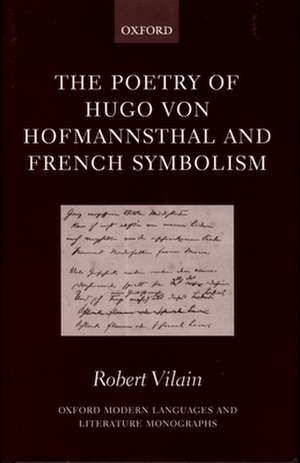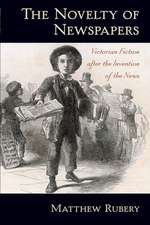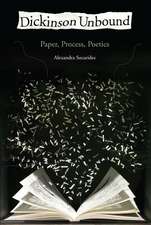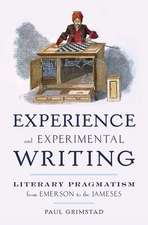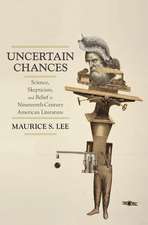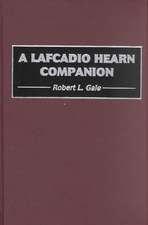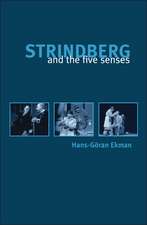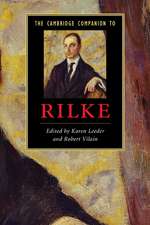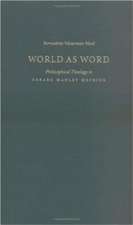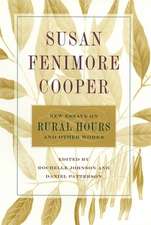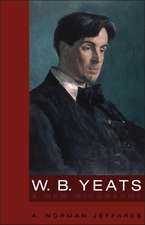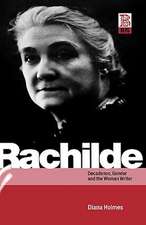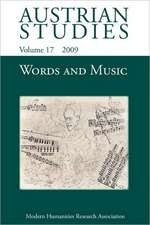The Poetry of Hugo von Hofmannsthal and French Symbolism: Oxford Modern Languages and Literature Monographs
Autor Robert Vilainen Limba Engleză Hardback – 8 iun 2000
Din seria Oxford Modern Languages and Literature Monographs
- 27%
 Preț: 488.30 lei
Preț: 488.30 lei - 28%
 Preț: 498.29 lei
Preț: 498.29 lei - 28%
 Preț: 403.98 lei
Preț: 403.98 lei -
 Preț: 220.24 lei
Preț: 220.24 lei - 30%
 Preț: 529.17 lei
Preț: 529.17 lei - 23%
 Preț: 473.14 lei
Preț: 473.14 lei - 28%
 Preț: 498.33 lei
Preț: 498.33 lei - 16%
 Preț: 471.35 lei
Preț: 471.35 lei - 16%
 Preț: 472.12 lei
Preț: 472.12 lei - 34%
 Preț: 1196.78 lei
Preț: 1196.78 lei - 34%
 Preț: 844.61 lei
Preț: 844.61 lei - 30%
 Preț: 628.12 lei
Preț: 628.12 lei - 34%
 Preț: 550.53 lei
Preț: 550.53 lei - 47%
 Preț: 339.43 lei
Preț: 339.43 lei - 34%
 Preț: 946.68 lei
Preț: 946.68 lei - 34%
 Preț: 977.57 lei
Preț: 977.57 lei - 46%
 Preț: 447.51 lei
Preț: 447.51 lei - 30%
 Preț: 714.11 lei
Preț: 714.11 lei - 47%
 Preț: 656.78 lei
Preț: 656.78 lei - 38%
 Preț: 327.25 lei
Preț: 327.25 lei - 34%
 Preț: 1166.63 lei
Preț: 1166.63 lei - 34%
 Preț: 847.82 lei
Preț: 847.82 lei - 31%
 Preț: 861.06 lei
Preț: 861.06 lei - 45%
 Preț: 190.60 lei
Preț: 190.60 lei - 31%
 Preț: 363.64 lei
Preț: 363.64 lei - 23%
 Preț: 275.97 lei
Preț: 275.97 lei - 31%
 Preț: 787.32 lei
Preț: 787.32 lei - 34%
 Preț: 1167.72 lei
Preț: 1167.72 lei - 45%
 Preț: 468.18 lei
Preț: 468.18 lei - 34%
 Preț: 1109.57 lei
Preț: 1109.57 lei - 34%
 Preț: 1080.11 lei
Preț: 1080.11 lei - 30%
 Preț: 699.95 lei
Preț: 699.95 lei - 34%
 Preț: 934.25 lei
Preț: 934.25 lei - 30%
 Preț: 625.20 lei
Preț: 625.20 lei - 34%
 Preț: 992.04 lei
Preț: 992.04 lei - 34%
 Preț: 816.70 lei
Preț: 816.70 lei - 51%
 Preț: 829.26 lei
Preț: 829.26 lei - 30%
 Preț: 773.81 lei
Preț: 773.81 lei - 34%
 Preț: 530.74 lei
Preț: 530.74 lei - 30%
 Preț: 658.73 lei
Preț: 658.73 lei - 34%
 Preț: 845.75 lei
Preț: 845.75 lei - 31%
 Preț: 802.74 lei
Preț: 802.74 lei - 34%
 Preț: 1034.42 lei
Preț: 1034.42 lei - 34%
 Preț: 1254.44 lei
Preț: 1254.44 lei - 31%
 Preț: 387.21 lei
Preț: 387.21 lei - 51%
 Preț: 698.53 lei
Preț: 698.53 lei - 28%
 Preț: 462.34 lei
Preț: 462.34 lei - 34%
 Preț: 947.44 lei
Preț: 947.44 lei - 34%
 Preț: 887.47 lei
Preț: 887.47 lei
Preț: 1169.33 lei
Preț vechi: 1778.82 lei
-34% Nou
Puncte Express: 1754
Preț estimativ în valută:
223.88€ • 229.66$ • 188.50£
223.88€ • 229.66$ • 188.50£
Carte tipărită la comandă
Livrare economică 15-21 februarie
Preluare comenzi: 021 569.72.76
Specificații
ISBN-13: 9780198160038
ISBN-10: 0198160038
Pagini: 388
Dimensiuni: 146 x 224 x 27 mm
Greutate: 0.58 kg
Editura: OUP OXFORD
Colecția OUP Oxford
Seria Oxford Modern Languages and Literature Monographs
Locul publicării:Oxford, United Kingdom
ISBN-10: 0198160038
Pagini: 388
Dimensiuni: 146 x 224 x 27 mm
Greutate: 0.58 kg
Editura: OUP OXFORD
Colecția OUP Oxford
Seria Oxford Modern Languages and Literature Monographs
Locul publicării:Oxford, United Kingdom
Recenzii
By the end of this fine book we have been privileged to explore Hofmannsthal's hesitancies and triumphs, seen him both as a child of his time and a frequently agonized seeker after his own identity. We have also been conducted down fascinating by-lanes to re-assess the poet's forebears and contemporaries with the most illuminating results. We have been compelled also to re-interpret any preconceptions we may have had about the 'symbolist' movement
This is a rich and densely informative publication. Vilain examines in telling detail the European literary scene during the 1890s
This is a rich and densely informative publication. Vilain examines in telling detail the European literary scene during the 1890s
